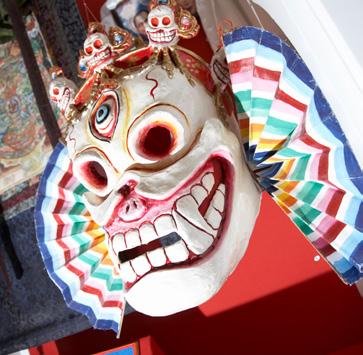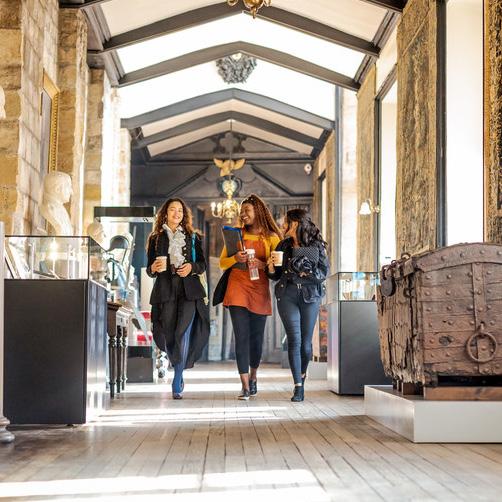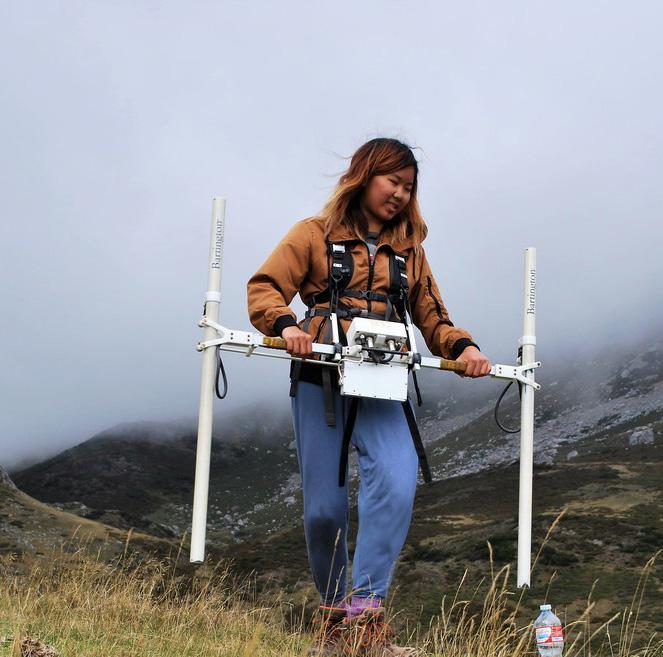Faculty of Social Sciences and Health: International Brochure







Contents 4 Introduction 6 Collaboration in Global Higher Education 8 Combined Honours in Social Sciences 10 Department of Anthropology 12 Department of Archaeology 14 Department of Geography 16 Department of Sociology 18 Department of Sport and Exercise Sciences 20 Durham Law School 22 School of Education 24 School of Government and International Affairs 26 Education and International scholarships 28 Map 30 Statistics 3
Introduction
This brochure highlights the Faculty of Social Sciences and Health’s extensive global collaboration in research and education with partners across the world, promoting Social Science solutions to the world’s greatest challenges.
The Faculty of Social Sciences and Health leads the university in some key areas of international research and global engagement, with particular impact in engagement with the Global South and with specific expertise in the areas of Risk, Security, Health, Education and CPD and training in NGOs and development. The Faculty has active undergraduate and postgraduate programmes which match these research strengths.
The stories presented here demonstrate sustained and positive engagement with international partners, particularly around work with social justice in society and the United Nations Sustainable Development Goals. Our eight departments have funded research projects on every continent, and countries from Canada to India to China and Sri Lanka to name but a few. Research in the faculty is multisited, interdisciplinary and informed by working in partnership with NGOs and organisations beyond the academy. In the Faculty’s international work there’s a strong emphasis on ethical internationalisation, internationalisation for a socially just society and decolonisation of the curriculum and research.
We hope this material articulates the values and themes of the international work across the Faculty. The brochure has a double page spread for each of our departments. We include a focus on the regions important to Durham University’s global strategy, namely, India, China, North America, South East Asia and Europe.
We hope that our global partners, prospective students and local communities will be engaged by the stories here of our international work.

4
Our eight departments have funded research projects on every continent, and countries from Canada to India to China and Sri Lanka to name but a few.

5
Collaboration
in Global Higher Education
International collaboration is a strong element of the work across all departments in the Faculty of Social Sciences and Health. Our Centre for Sustainable Development Law and Policy (CSDLP) is an interdisciplinary centre for research, collaboration and education with a focus on sustainability and the UN Sustainable Development Goals. The CSDLP looks for innovative solutions to global challenges facing the international community and humanity as a whole, such as climate change, the energy transition, biodiversity loss and planetary health. Our objective is to offer solutions beyond academia and across societies, including in the Global South. The Sustainable Development Goals (SDG) serve as cross-cutting themes in our research projects, policy work and collaborative initiatives, including education and training, gender, health and wellbeing.
We support individual and joint projects, offering development opportunities in particular to Masters students, PhD students, and early career researchers. We’ve launched an exciting new Masters programme on International Environmental Law, which includes a focus on International Climate Change Law. Students will join our community and be closely involved in the CSDLP, its research projects and convenorship, including additional seminars, lectures and conferences.
We aim to deliver local and global projects and are working with international partners and organisations including the International Research Advisory Board and CDP. In 2022, we signed a memorandum of understanding with the Centre for International Law (CIL) at the National University of Singapore (NUS). In October, we collaborated with NUS to organise two workshops on the ‘Global Stocktake’ under the Paris Agreement with the support of the UNFCCC secretariat.
We also organised a session at the Education Hub during COP27: ‘Collaboration in Climate Research and Education’, which received over 61,000 views on social media. The event had three main objectives. The first was to extend collaborations with others, from a diverse range of UNFCCC constituencies, through communicating our own research interests. The second was to share our ongoing projects and educational programmes, for example our Global Environmental Law Lecture Series, which is contributed to by Justices from the highest courts globally (India, Thailand, Nepal, Germany, Australia and others); our collaboration with CIL/NUS to provide workshops on the Global Stocktake; and our aforementioned new Masters programme. The third objective was to promote new initiatives in other institutions, and to invite partners interested in working together, to achieve better climate and SDG education and at a larger scale.
Finally, we set out the ESEI objectives (Extending, Sharing, Exploring and Involving) in the CSDLP – where we seek to extend partnerships and collaboration, share knowledge and networks, explore how we can support the UNFCCC and its goals, and involve our students and researchers at all levels of their career into the work we’re doing.
6
Scan the QR codes below for more information
> Centre for Sustainable Development Law and Policy
> Masters in International Environmental Law
We support individual and joint projects, offering development opportunities in particular to Masters students, PhD students, and early career researchers.

7
Combined Honours in Social Sciences
Teaching topics beyond borders
A multidisciplinary approach
Durham students have the option of an interdisciplinary undergraduate degree programme in Combined Social Sciences. Unlike many degrees at UK universities which require students to specialise in a single subject, this programme allows students to combine modules from two to four subjects to build a degree that suits their interests.

Students often apply for Combined Social Sciences when they have several different academic strengths and don’t want to limit themselves to a single subject. In this flexible programme, they can combine existing interests with exciting new options to create a bespoke degree. Many students use this flexibility to explore issues close to their heart, such as sustainability or social inequality.

Students on our Staff Student Consultative Committee have opted to act as an international community instead of having one representative.
We’ve brought this topic-based approach to our curriculum, with undergraduates having the option to write an interdisciplinary dissertation to bring together the theories and concepts they’ve studied within the programme. We also have a new multidisciplinary module open to first year students, ‘Decolonising Knowledge and Power’, starting in 2023/24.
Students have the opportunity to apply to study a year abroad or undertake a paid work placement (either in the UK or internationally). Due to the flexibility of the degree, Combined Social Sciences students are in a strong position to work for a range of organisations, from multinational corporations and government agencies to small businesses.
Durham’s Combined Social Sciences department offers incredible flexibility and inclusiveness. Being elected as a departmental representative, I am able to raise any issue related to academics or EDI… From the perspective of an international student, my voice is always heard and respected, and I have been fully supported and encouraged to do my best.
Zhanyan Dong, final year student
8
Strong international community
We put a great deal of emphasis on building a welcoming student community, who don’t necessarily meet each other regularly in the modules they study. We have a well-established peer mentor scheme where every first year student is matched with a mentor in their second or final year. Mentors and mentees meet regularly to help the first years settle into university life. Senior mentors help to run the scheme, ensuring that it’s peer-led and delivers what students continue to need.

As well as peer mentor groups forming supportive micro-communities within the programme, our Combined Honours Social Society also work hard to deliver a series of social events for our international community of students throughout the year. They have organised quiz evenings, waffle parlour visits, hummus tasting nights, and even a winter ball!
We elect a set of student representatives each year to sit on our Staff Student Consultative Committee which makes more formal decisions about how the degree programme should adapt and improve. A number of international students are on this committee, who have opted to not have a singular official representative, but to instead act as an international community with internationalisation thought of more broadly within the department.
Everybody has been friendly and inviting in the university, whether it is staff or student. After a few weeks in I feel as if I’ve already been integrated into the community. Especially with such a modular course, I’ve been exposed to all sorts of motivated students and staff.
 Ammar Alhady, first year student
Ammar Alhady, first year student
9
more information
Scan the QR codes below for
> Degree programme
> Year abroad
> Placement year
Many students use the degree programme to explore issues close to their heart, such as sustainability or social inequality.
Department of Anthropology

Working with students and locals in the field

Women, transport and employment in Africa
Young women in Africa face discrimination as transport users and employees, affecting access to work and education. Increasing their employment in areas like commercial driving and vehicle repair can contribute to women feeling safer using public transport. A research project led by Professor Gina Porter aimed to explore and address these challenges.
The project focused on young women in marginalised areas of three cities: Abuja (Nigeria), Tunis (Tunisia) and Cape Town (South Africa). It had three, interlinked strands: ‘user’ – transport usage, barriers, and access to employment and training – ‘employment’ – experiences in the transport sector – and ‘action research’, which built on findings to create transport-related training.
We employed peer researchers in each area to better understand local context and constraints. They interviewed transport users on-the-go and wrote mobility diaries, raising a range of issues. Our teams then conducted interviews with women on their travel and employment experiences.
Our research led to the creation of gender-sensitive transport skills guidance provided by our NGO collaborator, Transaid. Training was tailored to each city – e.g. a focus on motorcyclists in Abuja, where this is a popular mode of transport. For Cape Town, they ran genderbased awareness training for male taxi drivers, and upskilling in maintenance, customer service and business management for female taxi drivers.
For more on this project’s work in Tunis, see the School of Government and International Affairs section on page 24-25.
10
We employed peer researchers in each area to better understand local context and constraints.
Student international fieldwork in Gibraltar
We’re the only UK anthropology department to offer a residential field course to all our undergraduate students. One popular international field course is in Gibraltar, to study its human-primate interactions. Gibraltar is home to the only wild primates in Europe, giving students the opportunity for both social and primatological research. The ‘Gibraltar Apes’ are actually Barbary macaques, a species of monkey that live on the Upper Rock Nature Reserve.
Students stay for one week, collecting data over the first couple days to shape their research questions. Topics they can explore include folklore, Gibraltarian identity, and what the monkeys mean to the people living in and visiting Gibraltar. Some choose to focus on the relationship between the primates and Gibraltar’s tourists, while others decide to focus on solely on the people of Gibraltar, their culture, and their identity. Opportunities for observations include a ceremonial changing of the keys in the town square, the national museum, and many military sites.
Opportunities such as this offer students research-led teaching and hands-on experience, equipping them with the knowledge and skills they need for a successful future in anthropology.

Baby sleep health
We’re one of only a few departments to span not just social and evolutionary anthropology, but also anthropology of health. Some of our most impactful research has been through the Durham Infancy and Sleep Centre, which examines infant and child sleep and parenting behaviour. Our research into infant sleep safety has helped reduce rates of Sudden Infant Death Syndrome (SIDS) and provided health professionals and parents with evidence-based advice that’s made a global impact, including official infant sleep safety guidance in the UK.

We’re the only UK anthropology department to offer residential field courses to all undergrads.
Scan the QR codes below for more information
> Transport, youth and women project
> Undergraduate fieldwork
11
> Durham Infancy and Sleep Centre
> Masters programmes
Department of Archaeology
Building a global community of practitioners
Teaching body recovery to the world International practitioners and humanitarian organisations are benefitting from our forensic anthropology and archaeology training. The training, which includes the latest scientific techniques for body location, recovery and analysis, has been used by UK police forces, US and Australian search and rescue teams, and the International Committee of the Red Cross (ICRC). It’s now available as an online course, with 28,000+ participants from over 147 countries enrolled.
Professor Rebecca Gowland was invited by the ICRC to develop the course after collaborating with them to help build local capacity in regions of conflict and genocide. The success of the course has led to Professor Gowland assisting in formulating strategies in high-profile forensic contexts – such as co-authoring a report on optimising the location, recovery and identification of individuals killed during the Chechen war.
The methodologies will be included as part of our new MSc in Forensic Archaeology and Anthropology, unique to the UK in terms of its strong international humanitarian focus. The MSc will be directed by Professor Gowland and our recently arrived Dr Daniel Gaudio. Dr Gaudio’s research interests include skeletal trauma analysis, forensic anthropology, palaeopathology and taphonomy.


12
Collaborating to preserve Asian heritage International heritage sites are at serious risk from development, environmental hazards, and conflict. Our field programmes in South Asia, led by UNESCO Chair Robin Coningham, combine archaeological investigations and community mapping to record local heritage and traditions. For example, our innovative ‘risk maps’ have helped reverse damaging proposals and enabled interventions supporting sustainable pilgrimage protection, benefitting local communities.
We’ve helped strengthen post-disaster guidelines in Nepal after the 2015 earthquake. While researching the contributing causes of the collapse of historic monuments, we identified indigenous seismic adaptations which have informed the renovation and reconstruction of damaged monuments in Kathmandu.
Prioritising in-field training, we’ve encouraged the mobility of heritage practitioners in Asia to gain new insights and share expertise. This has led to the adoption of risk maps in Nepal, Myanmar, and India, as well as the postdisaster methodologies co-designed in Kathmandu applied to conflict-damaged heritage in northern Sri Lanka.
Many of our methodologies have been incorporated into our new module ‘Protecting World Heritage’. An option within the MA International Cultural Heritage Management programme, it provides students with practical applications of research-led learning across Durham’s UNESCO World Heritage Site.
We’ve also welcomed Dr Qian Gao to our MA team. Specialising in Chinese heritage, Dr Gao’s research focuses on addressing cross-cultural and cross-disciplinary issues in heritage studies that go beyond the established boundaries between tangible and intangible, Eastern and Western, scientific and humanistic approaches.
> Online courseForensic Archaeology and Anthropology
> Durham World Heritage Site

13
We’ve helped strengthen post-disaster guidelines in Nepal after the 2015 earthquake.
Scan the QR codes below for more information
> MSc Forensic Archaeology and Anthropology
> MA International Cultural Heritage Management
Department of Geography
Where human and physical geography meet on an international scale

Climate change, pandemics and the city – global impacts
Durham research in Geography has helped shape the UN-Habitat’s urban climate governance, chiefly through Professor Harriet Bulkeley’s role in developing their Guiding Principles for City Climate Action Planning. The team analysed 627 climate experiments in 100 cities, as well as case study work in Bangalore, Monterrey, Hong Kong, Philadelphia, and Berlin. Endorsed by key transnational organisations supporting urban action on climate change, these principles are used both by UN-Habitat to develop and evaluate strategies for cities around the world and by partner organisations such as WWF for their One Planet City Challenge.
Professor Bulkeley also coordinated the Naturvation project, which examined urban nature-based solutions to climate change and environmental issues. 80 researchers from 14 institutions in six European countries observed what naturebased solutions can achieve in cities, for example, green roofs and city parks that limit heat stress. One development from the project was the Urban Nature Explorer, an open-access tool that can visualise these solutions in any city.
The DenCity project, led by Professor Colin McFarlane, examines relationships between high density living, politics and social practices in cities including Hong Kong, London, Mumbai, Manila and Tokyo. The project studied the nature, role and potential of density in cities and how density is understood, governed and politicised. The COVID-19 pandemic had a powerful, if accidental impact on the direction of the project, including research on how citizens have experienced and perceived density and crowds as the pandemic unfolded.
Our research in human geography also extends to economic geography. Dr Karen Lai’s work focuses on financial networks and practices in Asia, examining the organisation and strategies of investment banks and implications for financial centre development, as well as changing consumer practice with the growth of FinTech apps and platform companies. Her new project, starting in Singapore, looks at data centres development in southeast Asia.
14
Durham research in Geography has helped shape the UN-Habitat’s urban climate governance.
Preparing for disaster
Earthquakes and associated hazards such as landslides are a major recurring threat across many countries. Our work in Nepal informed the humanitarian response to the devastating 2015 Gorkha earthquake, as well as preparedness efforts for future events. Led by Professor Nick Rosser and Professor Alex Densmore, new research has highlighted two themes in improving resilience to large earthquakes: the quantification of hazards of earthquaketriggered and post-earthquake landslides, and the development of innovative earthquake scenarios for humanitarian contingency planning.

Our ensemble of earthquake scenarios has been used by the UN, Government of Nepal, and international NGOs to underpin the national earthquake Emergency Response Preparedness Plan, which guides the response of the UN Humanitarian Country Team in Nepal to the next major earthquake. Research is being continued with the SajagNepal project, which uses multi-national partnerships to improve preparedness for the mountain hazard chain in Nepal.
Our taught masters programmes – MA/MSc Risk
Explore global challenges such as climate change, disasters, and geo-politics with our taught masters programmes, including the MA and MSc programmes in Risk. Popular with international students, the programmes often see applicants with experience working within governments and NGOs looking to develop their careers and skillsets. We now offer five programmes, each tailored to address urgent environmental, political, and social challenges. Scan the the QR code on the right to learn more.

I chose the climate risk module, which I thoroughly enjoyed because you can focus in on parts of the world that you’re passionate about.
Rebecca Tyrrell, MA in Risk 2020-21
Scan the QR codes below for more information
> The Naturvation project
> The DenCity project
> The Sajag-Nepal project
> Urban Nature Explorer
15
> Risk Masters programmes
Department of Sociology
Social research making a difference to people’s lives across the globe
Ending violence against women
Many have argued that more men need to engage with the movement against male violence towards women to create social change and prevent further abuse.
Professor Nicole Westmarland, Director of the Durham Centre for Research into Violence and Abuse (CRiVA), and her colleagues have carried out multi-country research into why some men take a public stance against violence towards women, and how we can encourage others. Working with academics across Sweden, Spain and the UK, questionnaires and in-depth interviews were used to collect information on the personal backgrounds of the men taking part in the study.
The research found that many men experienced an ‘awakening’ after hearing about the experiences of women in their lives, or from witnessing other men’s violent acts. Others felt they didn’t fit into the societal ‘mould’ of masculinity expected of them or felt spurred to speak out after a horrifying high-profile case in the media.

A free e-book based on the research has been made available, and CRiVA researchers have created a monthly podcast series to explore issues of men, masculinities and gender equality and how feminism is relevant to the lives of men and boys.

16
The multicountry research looks into why some men take a public stance against violence towards women.
Harmful sexual behaviour in children
Pioneering research into children and young people with harmful sexual behaviour (HSB) has transformed policy and practice both in the UK and internationally.

For over 20 years, CRiVA researchers, led by Professor Simon Hackett, have been working to address significant gaps in policy and services for children and their families. Findings from the research has been generated into key models and frameworks to be used by professionals working with children with HSB.
Notably, this includes the first ever national-level public health guidelines published by the National Institute for Health and Care Excellence (NICE). The research also has co-produced an National Society for the Prevention of Cruelty to Children (NSPCC) operational framework, leading to more consistent policy and practice responses and supporting local areas to improve their services. The framework has been presented at key international conferences in the UK, USA, and at the Council of Europe, as well as Australia where the framework has been recommended as a model of best practice.
Combatting loneliness
Loneliness is a serious global social issue, often studied through the lens of psychology or medicine. Dr Keming Yang studies loneliness as a social problem, symptomatic of the relationship between the individual and the society at large.
Dr Yang’s work emphasises the national context in loneliness – for example, loneliness appears to be more prevalent in Russia and Eastern European countries than in Western and Northern Europe.
As one of few sociologists looking at this topic, Dr Yang was recently sponsored with an international fellowship at the Japan Society for the Promotion of Science (JSPS) and received a visiting scholarship at the Leibniz Institute for the Social Sciences (GESIS). He also presented both his and his department’s research at Uppsala University and has had his work featured in international papers such as Iran Daily.
Dr Yang’s work on loneliness has led to his book, Loneliness: A Social Problem, which has now been translated into Chinese.
Scan the QR codes below for more information
> CRiVA Centre
> Men’s Activism e-book
> Now and Men podcast
> Masters programmes
17
Loneliness appears to be more prevalent in Russia and Eastern European countries than in Western and Northern Europe.
Department of Sport and Exercise Sciences

Addressing inequality and social justice
Misogynistic attitudes to women’s football

We’re now in a time of increased media coverage of women’s football. Dr Stacey Pope led research in collaboration with the University of Leicester and the University of South Australia to study male football fans’ attitudes towards women’s sports, surveying 1,950 men recruited from fan message boards.
The respondents could be split into three different groups: those with progressive attitudes towards women’s sports (24%), those with overtly misogynistic attitudes (the most dominant group at 68%), and those with covertly misogynistic attitudes (8%), expressing progressive views publicly but sexist views in private or male-dominated spaces. Many fans in the progressive group expressed that increased media coverage had changed their perceptions on women’s sports.
Press for the research’s findings had a global media reach of just under 2 billion, with coverage on over 450 media outlets, including a Sky Sports News interview with Dr Pope.
Dr Pope has also studied how and why people become fans of women’s football in an international collaboration with Dr Rachel Allison (Mississippi State University). Interviewing fans in England and the United States, they found that ‘mega events’ (Olympic tournaments, Women’s World Cups) were a key entry point for the majority of both US and English fans, usually after encountering them on television. Just under a quarter said their fandom developed online, while 42% of US and 16% of English respondents become fans after playing football themselves –this pathway existed only among women. The findings show the importance of media coverage in leading people to become fans of women’s football.
18
Many fans expressed that increased media coverage had changed their perceptions on women’s sports.
Scan the QR codes below for more information
42% of US and 16% of English respondents become fans after playing football themselves.
>
in Physical Activity, Health and Society

 > Dr Pope Sky Sports
> Dr Pope Sky Sports
19
> Gender Revolution
> Fans Love Women’s Football
Masters
Durham Law School
Impacting law across the globe

Global collaboration
In today’s globalised economy, an understanding of the social and legal relationships that link individuals, businesses, states and transnational institutions is essential, not just for economic advantage, but also to address the wider socioeconomic problems that arise. Studying law needs to be more than learning legal doctrine – it needs to have a broader international context. Our staff, half of whom are from outside the UK, aim to prepare students for a global future where the law has a crucial role in addressing today’s and tomorrow’s challenges.
Our engagement with significant new legal orders is exemplified by our Centre for Chinese Law and Policy (CCLP), the largest centre for Chinese law outside Asia. The CCLP is a member of the Asia-Pacific and Europe Law Institutes Alliance, a recently established league that consists of a cohort of top institutions including the British Institute of International and Comparative Law and elite law schools in China, Singapore, Hong Kong and Australia. Currently, we’re establishing joint PhD programmes with prestigious Chinese universities.
We’re well connected with institutions in other growing and established economies. Recognising the importance of India as a legal and commercial hub, we’re developing a Centre in Indian Law, with rollout in 2023. We have active research linkages in Indonesia and Thailand, and a strong alumni network in the latter. Over 60 members of the Thai judiciary are alumni.
Our strengths go beyond jurisdictional focus: our world-leading research includes areas such as commercial and corporate law, socio-legal studies, human rights, comparative law, environmental and bio-law.

20
Resolving transnational disputes
We have a strong presence in Canada and the US. Our staff includes several faculty members who’ve trained and practiced in North America, and held visiting positions at institutions including Columbia, Harvard and Yale.
The expansion of cross-border investment and trade has led to increased and ever more complex relationships between businesses, investors, and states. When these relationships break down, arbitration is the most frequent means parties choose to resolve their dispute. We run an annual summer school on International Arbitration. Our programme is a unique combination of theory and practice, offering instruction on the theoretical foundation and principles behind arbitration, as well as practical instruction, including guidance on best practices in written and oral advocacy.
To ensure our graduates are best equipped for careers in a world challenged by social and environmental issues, we focus on climate change and sustainability, and developing an international legal regime to support these practices. The University holds permanent NGO observer status at the United Nations Framework Convention on Climate Change, enabling staff and students to play an active role.
Durham Global Environmental Law Lecture Series:
We’re offering a free lecture series on global environmental law, with insights from judges from around the world. As several international declarations and agreements reach milestone anniversaries, we explore the issues they address and the role they’ve since played in judicial decision-making.
Scan the QR code below for more information
Scan the QR codes below for more information
> Durham Law School
> Chinese Centre for Law and Policy
> Durham Law School events page
> International Arbitration news story

21
We aim to prepare students for a global future where the law has a crucial role in addressing today’s and tomorrow’s challenges.
School of Education
Improving practices for school children around the world
Better outcomes for children starting school


International interest in early childhood education has increased, with administrations acknowledging the importance of a good start to children’s future progress. The iPIPS project, conducted over 20 years by Professors Peter Tymms and Christine Merrell, has led to an assessment system that’s had significant impact on educational understanding, policy and practice around the world and has been used with over two million children.
The project has added an international element to the PIPS Baseline Assessment developed by Professor Tymms in 1994, assessing children in Brazil, Lesotho, Russia and South Africa. iPIPS uses a series of fun, interactive and adaptive activities to assess cognitive and physical development in children’s first few weeks of school, while their teacher measures their personal, social and emotional development. The assessment is then repeated at the end of their first year to monitor their progress.
The importance of iPIPS has been noted the OECD, and the assessment was introduced at the start of school in England. International policy changes include new educational instructional material and approaches in Rio de Janeiro, the use of data to inform policies in Kazan, and changes to educational practice in Brazil, South Africa, and Lesotho.
22
The assessment system has had significant impact on educational understanding, policy and practice around the world.
Teaching and Learning Toolkit
The Education Endowment Foundation’s Teaching and Learning Toolkit is an evidence-based guide schools on outcomes for learners, particularly those from disadvantaged backgrounds. Based on summaries of research evidence from evaluations and led by Professor Steve Higgins, it covers 30 different educational topics. It supports schools in spending their resources, particularly their Pupil Premium allocation in England, more thoughtfully and more effectively. Crucially, it estimates the impact of different approaches on pupil attainment, as well as the financial costs of adopting each approach. This cost/benefit guidance has proved highly beneficial to schools and policy makers in multiple countries.

Working with local partners, we’ve now developed customised online versions of the Toolkit for Scotland, Australia, Spain, Latin America, the Middle East and Cameroon. It’s directly influenced UK Government policy and spending on education and policy decisions of governments outside England. As the ‘What Works Centre for Educational Achievement’ it’s also influenced the development of other evidence centres in the UK. The Toolkit guides the work of the Education Endowment Foundation and its funding strategy to reduce inequalities in school outcomes and is now consulted by more than two thirds of all headteachers in England.
The Dyslexia debate
Professor Julian (Joe) Elliott’s research has led to international debate on the topic of dyslexia as he’s shown that its current conception, assessment, diagnosis and resourcing are scientifically and ethically problematic. Spanning the fields of genetics, neuroscience, cognitive science, psychology, education and social policy, his work has highlighted the imperative to support all struggling readers, rather than that small population who have received a dyslexia diagnosis.
This research has gained significant international media attention. He’s been interviewed on the BBC Evening News, New Zealand Breakfast TV, Radio 4’s Today Programme, and many other television and radio outlets. In the UK, it’s influenced policy at both national and Local Authority level and led to changes in psychological and educational assessment and intervention. This work led to Professor Elliott’s receipt of the British Psychological Society’s 2020 Award for Outstanding Contribution to Educational Psychology.
Scan the QR codes below for more information
> iPIPS project
> Teaching and Learning Toolkit
> The Dyslexia Debate
> Masters programmes
23
Working with local partners, we’ve now developed customised online versions of the Toolkit for several countries.
School of Government and International Affairs
The impact of collaboration

A unique collaboration –understanding China

Working with China presents significant opportunities with its global economic platform Belt Road Initiative (BRI). To help navigate, the School has launched our ‘BRI dialogues’ as part of our alSabah Programme. Led by Professor Anoush Ehteshami in partnership with 3Sixty Strategic Advisors, these conversations with key decision shapers give a deep dive into the changing nature of the international system and the growing global role of East Asia.
These dialogues aim to provide senior executives and decision makers with actionable, relevant insights on China and its BRI programme of activities. They seek to establish a clearer appreciation of how to ‘COPE’ in China: how to deal with Complexities, capitalise on Opportunities, understand the country’s return to Power, and brace for the impact of the Externalities of China.
Key guests to our dialogues include prominent academics from other universities including Stephen Chan PBE, Professor Shaun Breslin, and Associate Professor Niv Horesh, as well as other influential people such as journalist James Chau, business leader Louis-Vincent Gave, and development economist Anzetse Were. The conversations are all available on YouTube – see the QR code to the right.
24
Working with China presents significant opportunities for SGIA and the Faculty of Social Sciences and Health.
Working across departments to improve female travel safety

Our research involves collaboration with other faculty departments. Professor Emma Murphy was co-investigator for Anthropology-led research project, ‘Youth engagement and skills acquisition within Africa’s transport sector’. Spread across three cities with Professor Murphy based in Tunis, the study focused on young female transport users and workers and led to gender-sensitive transport skills guidance.
There were three, interlinked strands to the research: the ‘user strand’, ‘employment strand’ and ‘action research strand’. In Tunis, researchers were employed on the ground to interview users and workers across the transport network: male and female taxi drivers, female bus drivers –sometimes sitting with them as they drove – tram drivers and transport union reps.
Transaid, an NGO, used this research to create training programmes for female transport users and employees. For users, the training helped women understand how the transport system is organised – i.e. who’s responsible for what, how to identify issues and report them, and what and how to demand of transport companies.
For workers, Transaid worked with public transport companies to deliver training to upskill female management. While this training was disrupted by the COVID-19 pandemic, with trainees struggling to access online training and later get time off for in-person training, the training was reported as being invaluable for these women.
More on this project can be found in the Department of Anthropology section on pages 10-11
Pro- and anti-migrant mobilisation in the Mediterranean
Political processes that unfold in refugee reception sites often spur mobilisations both for and against migration, leading to impacts ranging from legal ramifications in refugee protection to electoral support of the far right. Dr Olga Demetriou is coleading a project with Professor Antonis Ellinas (University of Cyprus) to analyse these processes, working with individuals and communities in Spain, Italy, Greece, and Cyprus to understand the dynamics of activist work around migration and the impact of refugee reception on local communities. The collaboration involves partnering with universities in Spain (University of Granada) and Italy (University of Siena) as well as a wide network of academics, practitioners, and activists in Europe and the MENA region.
Scan the QR codes below for more information
> BRI Dialogues
> Transport, youth and women project
25
> Masters programmes
Education and International Scholarships
International students
Durham has a long history of welcoming students and academics from countries across the globe. Over 4,500 international students from 156 countries chose to make Durham University their home, creating a welcoming and diverse community. Our academic curriculum has been shaped over the years to account for students coming from a wide range of national settings – from making course content more relevant and meaningful to an international audience, to evaluating how we can make assessments more inclusive to a wider range of students, to the different modes of teaching which we employ.
While all our students get access to resources such as advisor appointments, workshops, and career fairs, we also have tailored information for international students. This includes details of overseas opportunities and employers as well as job hunting platforms such as Student Circus. Our Durham International Student Employability Programme (DISEP) provides interactive sessions covering key elements of the job selection process that go into great detail on language use and cultural expectations of employers. Many of the employers we work with are registered sponsors of the Skilled Worker visa and are keen to recruit talented students and graduates from around the world.
We’re committed to supporting the best students regardless of their financial circumstances. We offer international scholarships and bursaries that are funded by us through partnerships with external organisations, or through generous donations from alumni and friends of the University. We specifically offer scholarships, awards and bursaries that are dedicated to support international students.

26
Over 4,500 international students from 120 countries chose to make Durham University their home.
International opportunities
Whether students are from the UK or overseas, we aim to provide a wellrounded, internationally focused curriculum. Our newly developed module beginning in the 2023 academic year, Decolonising Knowledge and Power, will be an elective option open to all undergraduate students in their first year. The cross-departmental, interdisciplinary module aims to introduce students to concepts and case studies related to decolonisation and promote the value of a multidisciplinary and intersectional perspective.


There are also opportunities for students gain intercultural experience during their degree. Many subjects include overseas trips as part of their programmes, such as international fieldwork – see our pages on Archaeology and Anthropology. All of our students can apply to spend a year abroad as part of their studies at one of our many partner universities, which can be an invaluable opportunity to gain a larger understanding of the wider world. Students can apply for a placement year, depending on the degree programme they’re on, as well as internships and volunteering opportunities.
Scan the QR codes below for more information
> Scholarships Bursaries and Awards
> Careers, Employability and Enterprise
> Information for international students
> GO Study Abroad programme
27
About Durham

Established in 1832 – the third oldest university in England

Located in the city of Durham with a UNESCO World Heritage Site at its historic centre
Edinburgh
Durham
London
Durham is a compact city but within easy access of larger cities and transport hubs:

• Newcastle
• Edinburgh
• London
• Amsterdam
Global presence in London, Delhi and Beijing
28
29 Durham
World Top 100
Over 300 undergraduate and






17 colleges

30
ranked 92nd in the QS World University Rankings (2023) 6th Times and Sunday Times Good University Guide 2023 6th Guardian University Guide 2023
subjects in the World Top 100 (QS World University Rankings by Subject 2022) 6th The Complete University Guide 2023
19
postgraduate courses
20,268 2020/21 student population
120 countries represented by staff and student bodies


4,300+ staff members
90% of our research rated ‘world-leading’ or ‘internationally excellent’
1st
Geography is top in the UK for overall research quality




6

of our departments are in the top ten for overall research quality



Telephone
Contact details
of Social Sciences & Health
Holmes Building
Site
Road
3LE
Durham University and Durham University logo are registered Trade Marks of the University of Durham™. Unless otherwise stated, all material in this brochure is copyright of the University of Durham. The University makes every effort to ensure that the information contained here is accurate.
Faculty
Arthur
Science
South
Durham DH1
+44 (0)191 334 2901
social.sciences@durham.ac.uk
Email
MW/02/23/038














 Ammar Alhady, first year student
Ammar Alhady, first year student
















 > Dr Pope Sky Sports
> Dr Pope Sky Sports






























